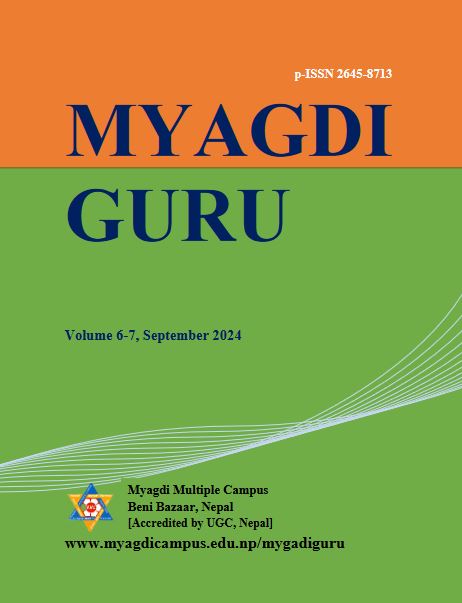Class, Marriage and Conflict in Alice Munro's "The Beggar Maid": A Marxist Approach
DOI:
https://doi.org/10.3126/mg.v7i1.70047Keywords:
Class, conflict, divorce, marriageAbstract
‘Class’ and ‘conflict’ are two inevitable and inseparable components of a society. Marx (1848) theorized and postulated that in society conflict is inevitable because of the existence of various classes. Different classes of society clash over the possession of power and limited resources. If a family, especially a married couple where two spouses are deemed as two different social classes, is considered a microcosm of society, conflict is an expected and inevitable phenomenon within a marital context. Now, it can be conceptualized that conflict occurs in a marriage since the family is a micro-unit of society, and this conflict leads to the divorce of the couple. However, now the question remains, does conflict occur in a marriage for the possession of power and resources as it happens in the case of a society, or whether there are other factors contributing to the conflict, and whether conflict is the only or chief reason for divorce of couples. This study, through the lens of Marx’s conflict theory, has tried to investigate whether the struggle over the possession of resources and power is the reason for the conflict between the two major characters of Alice Munro’s short story “The Beggar Maid” or whether other factors are contributing to their conflict, and also whether the conflict is the sole or main reason for the divorce between the two chief characters, Patrick and Rose. Arguably, the singular cause of the divorce of the two characters, Rose and Patrick, of Alice Munro’s short story “The Beggar Maid” is a conflict that stemmed from the incompatibility, disagreements, disparity in priorities, and lack of commitment arising from class division and the polarized state of the characters.
Downloads
Downloads
Published
How to Cite
Issue
Section
License
Copyright (c) 2024 The Author(s)

This work is licensed under a Creative Commons Attribution 4.0 International License.
This license enables reusers to distribute, remix, adapt, and build upon the material in any medium or format, so long as attribution is given to the creator. The license allows for commercial use.




